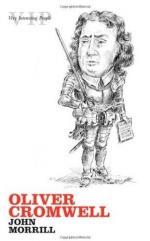|
This section contains 6,178 words (approx. 21 pages at 300 words per page) |

|
SOURCE: "Oliver Cromwell and English Political Thought," in Oliver Cromwell and the English Revolution, edited by John Morrill, Longman, 1990, pp. 234-58.
In the following excerpt, Sommerville analyzes Cromwell's speeches for evidence of his belief in Providence as a rationale for rebellion, seizure of power, and the execution of King Charles I.
… [What] was the political thought of Oliver Cromwell, and what were its ideological roots? There were, of course, a number of such roots, and not just one. Among the most important were a group of ideas about God's Providence, which deeply affected Cromwell's attitudes towards history, and towards politics. At times, too, he came close to endorsing the antinomian and millenarian notions that the godly should govern, despite the fact that no one had elected them—though he turned against this position after 1653. But the most important context for his thought—and, indeed, for Civil War political...
|
This section contains 6,178 words (approx. 21 pages at 300 words per page) |

|


